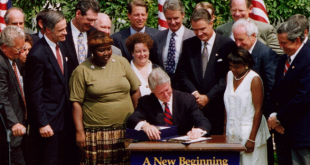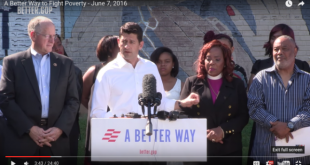Although a higher percentage of Republicans voted to pass the Civil Rights Act of 1964 and the Voting Rights Act of 1965 than Democrats, it was during this era that black Americans solidified their present-day loyalty to the Democrats.
Regardless of the perception of which party helped which group, history professor Matthew Delmont contended that Democrats haven’t delivered on their civil-rights promises. From The Atlantic:
Although the Civil Rights Act of 1964 helped end apartheid conditions in the South, a critical objective for which grassroots black Southern activists fought and died, the legislation did little to address the structures of racism that shaped black lives in cities like Chicago, Los Angeles, and Philadelphia. This was an intentional consequence of how the bill’s sponsors, largely liberals from the North, Midwest, and West, crafted the legislation.
As King understood, Democratic politicians acted more boldly on race issues in Alabama and Mississippi than in New York and Massachusetts. “There is a pressing need for a liberalism in the North which is truly liberal, a liberalism that firmly believes in integration in its own community as well as in the Deep South,” King told the New York Urban League in September 1960. As the Urban League’s executive director Whitney Young put it a few years later, “liberalism seems to be related to the distance people are from the problem.”
According to Delmont, the biggest problem for blacks is that Democratic politicians running on national and state levels don’t want to seem obligated to black voters who will put them in office.
Urban League Director Vernon Jordan outlined his concerns a year into Carter’s presidency: “We have no full employment policy. We have no welfare reform policy. We have no national health policy. We have no urban revitalization policy. We have no aggressive affirmative action policy. We have no solutions to the grinding problems of poverty and discrimination.”
The implication is that blacks need specific help from specific kinds of policies, not universal ones. But not even President Barack “Hope and Change” Obama wanted to seem “beholden.”
“Although his signature accomplishment, the Affordable Care Act, will surely benefit black Americans, he has been reluctant to endorse policies that cannot be pitched as universal. In a 2012 interview with Black Enterprise Magazine he said, ‘I want all Americans to have opportunity. I’m not the president of black America. I’m the president of the United States of America.'”
A true statement. But how long will blacks — who want their elected officials to focus on specific policies that purportedly would help blacks — continue to vote for liberals who make promises?
Regardless, the bottom line is that blacks will vote for the Democratic party in November — overwhelmingly.
 CURE News and Clergy Blog News and Commentary for Christians
CURE News and Clergy Blog News and Commentary for Christians



